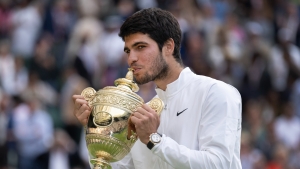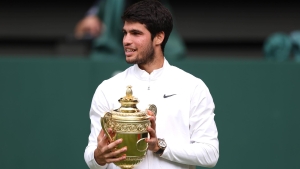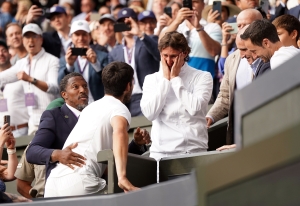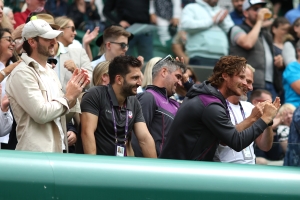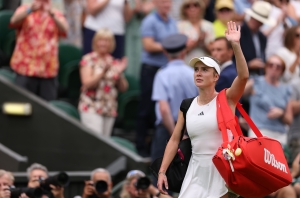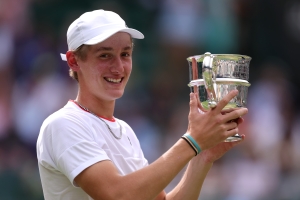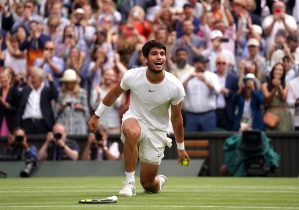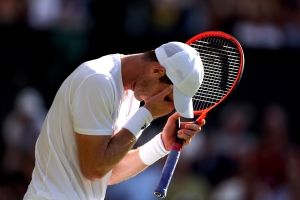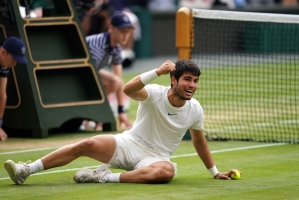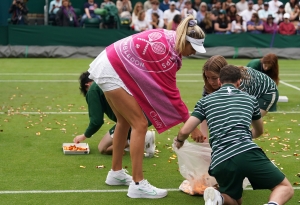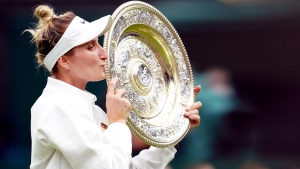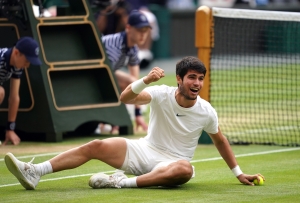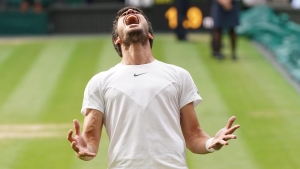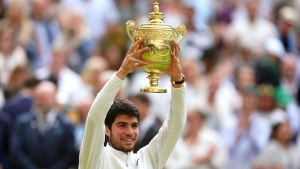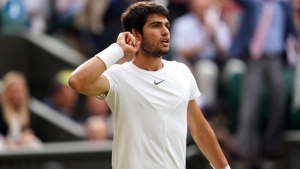Carlos Alcaraz celebrated a generational shift in tennis after dethroning Novak Djokovic in one of the great Wimbledon finals.
The young Spaniard looked to be on his way to victory when he recovered from a nervous start to take a two-sets-to-one lead only for Djokovic to show once again his remarkable powers of resilience.
It was he who appeared in the ascendancy at the start of the fifth set but back came 20-year-old Alcaraz to claim a 1-6 7-6 (6) 6-1 3-6 6-4 victory after four hours and 42 minutes, finally landing a meaningful blow for the young guns against the man 16 years his senior.
Alcaraz was not even born when Lleyton Hewitt in 2002 became the last man apart from Roger Federer, Rafael Nadal, Andy Murray or Djokovic to win the title here, and he is the youngest men’s champion since Boris Becker in 1986.
Alcaraz won his maiden slam title at the US Open last summer but, having beaten Casper Ruud on that occasion with Djokovic barred from entering the country, there is no question this is a far bigger, and potentially seismic, moment in the men’s game.
“I did it for myself, not for the tennis generation,” said Alcaraz. “(But) beating Novak at his best, in this stage, making history, being the guy to beat him after 10 years unbeaten on that court, is amazing for me.
“It’s something that I will never forget. It’s great for the new generation, as well, I think, to see me beating him and making them think that they are capable to do it as well.
“It’s the happiest moment of my life. I think it’s not going to change for a long time. Beating Novak, winning the Wimbledon championship, is something that I dream about since I started playing tennis.”
The defeat prevented Djokovic tying Federer with an eighth Wimbledon title, while it also ended his chances of winning the calendar Grand Slam this year and possibly forever, although he will surely have more opportunities to equal Margaret Court’s all-time record of 24 slam crowns.
This was the hottest ticket in town. Along with the Prince and Princess of Wales, Prince George and Princess Charlotte and King Felipe VI of Spain, Hollywood stars Brad Pitt, Hugh Jackman and Daniel Craig were attendance while, among the tennis ranks, sat in the stands with new men’s doubles champion Neal Skupski, was Murray.
The Scot was the last man to beat Djokovic on this court, 10 years and 46 matches ago, in that unforgettable final.
The excitement that fizzed around the arena threatened to evaporate as Djokovic pounced on Alcaraz, winning the first five games then the opening set in only 34 minutes.
Djokovic had two main regrets after the match, the biggest one being that he was not able to extend his record of consecutive slam tie-breaks won to 16.
He led 3-0 and had a set point at 6-5 only to net two routine backhands and then see an Alcaraz return fly past him.
In their first slam meeting in the semi-finals of the French Open last month, Alcaraz had been stricken by cramp after a similar first two sets, but here he looked far the better physically as he swept to the third set, breaking Djokovic for a second time in a 26-minute game comprising 13 deuces and seven break points.
But Djokovic is the master at rousing himself when he appears down and out and so it proved again.
The four-time defending champion had the momentum going into the decider but netted a high volley on break point at 1-0 and then hurled his racket against the net post in anger, smashing the frame, after Alcaraz broke in the next game.
Djokovic did all he could to apply pressure as the young Spaniard, who has extended his lead as world number one, stepped up to serve it out but Alcaraz showed what a truly special talent he is by pulling off a precision lob and a reflex volley before slumping to the grass when his opponent finally netted.
“Probably before this match I thought that I wasn’t ready to beat Djokovic in five sets, an epic match like this,” said Alcaraz. “I stayed good physically and good mentally about five hours against a legend.”
On learning from what happened in Paris, he added: “I am a totally different player than French Open. I grew up a lot since that moment. I learned a lot from that moment.”
Djokovic handled the defeat with impressive grace but broke down in tears when he saw his eight-year-old son Stefan applauding from the stands.
He admitted Alcaraz’s remarkably quick progression on grass had taken him by surprise and thought back to the close finals where he has come out on the other side.
“I’ve won some epic finals that I was very close to losing,” he said. “Maybe this is kind of a fair-and-square deal, I guess, to lose a match like this for me here. Even though it hurts.
“Credit to Carlos. Amazing poise in the important moments. For someone of his age to handle the nerves like this, be playing attacking tennis, and to close out the match the way he did. I thought I returned very well that last game, but he was just coming up with some amazing, amazing shots.
“Some regrets. I had my chances. I think I could have closed out that second-set tie-breaker better. But credit to him for fighting and showing some incredible defensive skills, passing shots that got him the break in the fifth. He was a deserved winner today.”
Alcaraz has a long way to go if he is to have anything like the careers that Djokovic and his long-time rivals Federer and Nadal have put together.
But the Serbian could not be more impressed with the 20-year-old as an all-round package, saying: “I think people have been talking in the past 12 months or so about his game consisting of certain elements from Roger, Rafa and myself.
“I would agree with that. I think he’s got basically the best of all three worlds. He’s got this Spanish bull mentality of competitiveness and fighting spirit and incredible defence.
“I haven’t played a player like him ever, to be honest. Roger and Rafa have their own strengths and weaknesses. Carlos is a very complete player. Amazing adapting capabilities that I think are a key for longevity and for a successful career on all surfaces.”
Alcaraz, still wearing his lucky bucket hat, burst into a wide grin when told what Djokovic had said.
“It’s crazy that Novak said that, honestly,” he said. “I don’t know. Probably he’s right. But I don’t want to think about it. I’m going to think that I’m full Carlos Alcaraz.”























